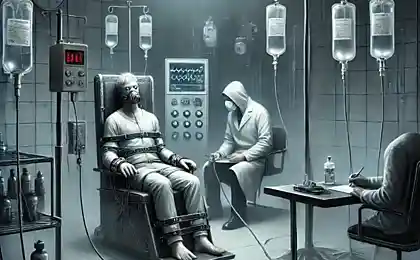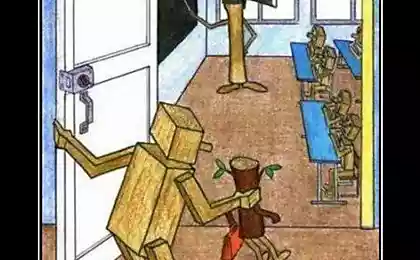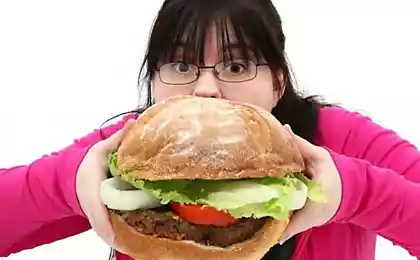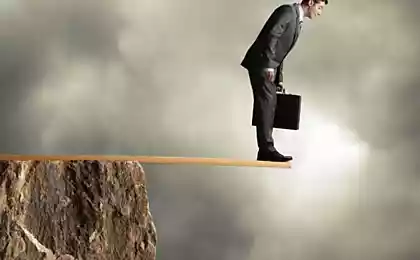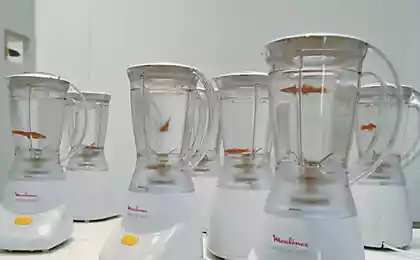706
7 experiments that prove how little we know about yourself
We sometimes think that we know everything about his character, and can accurately predict response to any action. In fact, a variety of experiments prove that your mind is more difficult than you think.
< Website I have collected 7 examples of what our nature is stronger than upbringing and hidden in people more than they think.
1. We can push ourselves to mnogoe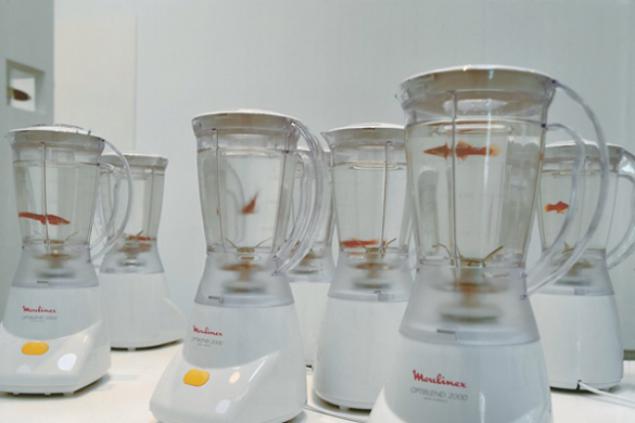
In 2000, the artist Marco Evaristti held performance. Visitors to the gallery to see ten blenders, in each of which swam goldfish. Anyone in the audience can destroy it by clicking on a button.
An hour later, one of the visitors made it. Immediately electricity disconnected, the police arrived. Gallery director accused of animal cruelty and fined.
2. We will "customize" the reality for our understanding of sebeV 1993 scientists from Ohio imposed makeup on the face of several women showing big ugly scars. They were given a look at yourself in the mirror and said that in this way they will be meeting with strangers. After that, the person allegedly struck a barrier cream, and actually washed away the scars, not notifying the participants of the experiment.
After the meeting, many of the women were told that they were subjected to various forms of discrimination and were even able to name exactly which words and actions of the source used to insult them.
While no one on the face was not visible flaws ("scars" have already removed), this knowledge was enough to make them feel discriminated against.
3. We note that few around him this experiment, the actor approached pedestrians to see the road. While a passerby explained between interlocutors were workers who carried the door, blocking them from each other for a few seconds. Actor replaced, and found himself in front of passers-by a different person - he is different from the first actor growth, clothing, hairstyle, voice. Still, most people do not notice the substitution.
This "change blindness", it shows how our perception selectively. Do not believe me? Check yourself: here are two photos and between them there is one difference. Try to find it, and as soon as you notice the difference, do not see it will not be possible.
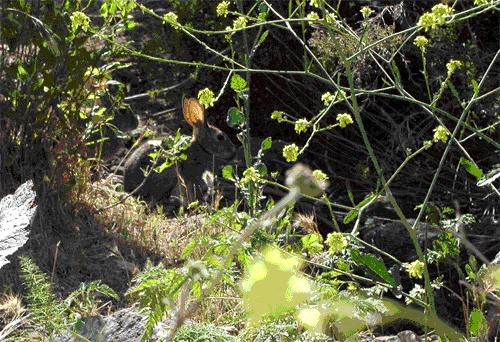
4. The strength of will directly affect our uspehiEksperiment "marshmallow test" was first held 40 years ago. It later emerged that preschoolers who were able to wait longer, are much less likely to have behavior problems, drugs and obesity in high school compared to children who do not survive and minutes.
Now scientists have continued to study with a group of adults who are now over 40. They showed the image on the computer screen, and along the way they were supposed to perform certain tasks. Those who demonstrated a lack of willpower as a child and as an adult coped with the task worse as distracted by the pictures.
Scientists emphasize that the lack of willpower does not mean lack of development of intelligence and in some cases denial of pleasure may be the wrong choice. "After all, the people who follow their emotional impulses, are great travelers or businessmen," - the author writes Maya Salavits.
5. In our Private greater cruelty than we dumaemPodval Stanford equipped as a prison and was invited to experiment with male volunteers. By lot student volunteers were divided into two groups of 12 people - to the "guards" and "prisoners." Before that, they were tested for mental stability and health status.
All participants in both groups received the same salary. The experiment was to last 4 weeks.
"Prisoners" were given prison clothes and assigned numbers, depriving them of their names. "Guards" were dressed in the real form of prison guards, were given batons and sunglasses hiding his eyes. They had one task - to monitor the "prisoners" without the use of force.
On the second day of the "prisoners" rebelled. To stop the unrest, "the guards" used fire extinguishers. Soon the "guards" have made their "prisoners" to sleep naked on the concrete, and the opportunity to use the shower and toilet became a privilege.
Sadism and cruelty showed one in three "guard" - they openly mocked "prisoners." One participant went on hunger strike, and he was placed in a closet close.
Another "prisoner" to offer or refuse blankets for one night, or leave a troublemaker in "solitary confinement" for the night. He agreed to only one person.
The experiment had to finish in a week instead of the planned four. Many of the "guards" regretted the early closure of the experimental prison in the basement of the university.
6. Authority to have higher moral norm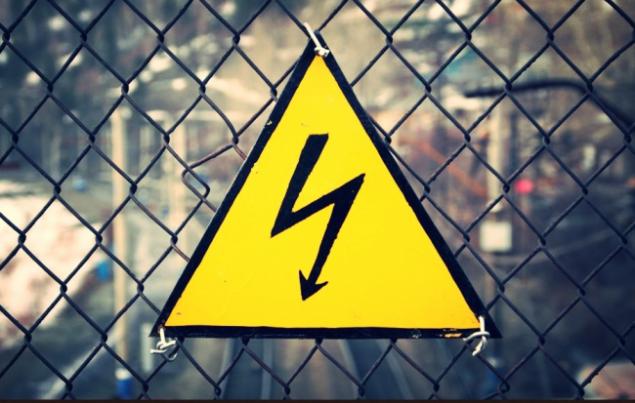
How many are willing to inflict suffering ordinary people to others, if it is part of their job responsibilities?
In the experiment at Yale University "student" I had to perform tasks, and "teacher" - check and punish him for every mistake discharge current. Of course, the "student" was just an actor and just pretended that receives discharge.
"Teacher" went into another room, where there was a generator with levers on which was written the voltage - that is, he was aware of the danger for the current test. Starting with 15, "teacher" with each new mistake was to increase the voltage up to 450 V. When it came to the strong impact, the experimenter demanded that the "teacher" has continued to use the last switch.
If the "teacher" doubted the experimenter asked him to continue, leading to ever more strong argument that it is necessary for the experiment. In addition, the "teacher" was assured that the "student" does not receive serious injuries.
The results showed that most of the "teachers" (26 of 40) dutifully continued to use the maximum voltage (450 V) as long as the researcher did not give the order to complete the experiment.
It showed a complete willingness to normal adults to go to great lengths following the authority.
7. Our beliefs prevent us perceive realnostArtur Ellison, a professor of electrical and Sportive decided to finish the lecture game. He asked a group of volunteers (some of them - his fellow professors) to focus on iron flower vase on the table. They had to look at it and try to force the mind to make a vase levitate. They succeeded: vase soared above the table. Allison was not surprised - he helped vase levitated by an electromagnet.
Then the opinions about the causes of this phenomenon are divided. One participant said he saw some gray substance that helps vase levitate. Another participant argued that nothing had happened and the vase did not budge.
Both the "edit" the reality for the sake of their beliefs and wrong.
Monkeys, money and prostitution
Broken windows theory
Pitfalls of consciousness
via www.adme.ru/vdohnovenie-919705/lovushki-soznaniya-638005/
< Website I have collected 7 examples of what our nature is stronger than upbringing and hidden in people more than they think.
1. We can push ourselves to mnogoe

In 2000, the artist Marco Evaristti held performance. Visitors to the gallery to see ten blenders, in each of which swam goldfish. Anyone in the audience can destroy it by clicking on a button.
An hour later, one of the visitors made it. Immediately electricity disconnected, the police arrived. Gallery director accused of animal cruelty and fined.
2. We will "customize" the reality for our understanding of sebeV 1993 scientists from Ohio imposed makeup on the face of several women showing big ugly scars. They were given a look at yourself in the mirror and said that in this way they will be meeting with strangers. After that, the person allegedly struck a barrier cream, and actually washed away the scars, not notifying the participants of the experiment.
After the meeting, many of the women were told that they were subjected to various forms of discrimination and were even able to name exactly which words and actions of the source used to insult them.
While no one on the face was not visible flaws ("scars" have already removed), this knowledge was enough to make them feel discriminated against.
3. We note that few around him this experiment, the actor approached pedestrians to see the road. While a passerby explained between interlocutors were workers who carried the door, blocking them from each other for a few seconds. Actor replaced, and found himself in front of passers-by a different person - he is different from the first actor growth, clothing, hairstyle, voice. Still, most people do not notice the substitution.
This "change blindness", it shows how our perception selectively. Do not believe me? Check yourself: here are two photos and between them there is one difference. Try to find it, and as soon as you notice the difference, do not see it will not be possible.

4. The strength of will directly affect our uspehiEksperiment "marshmallow test" was first held 40 years ago. It later emerged that preschoolers who were able to wait longer, are much less likely to have behavior problems, drugs and obesity in high school compared to children who do not survive and minutes.
Now scientists have continued to study with a group of adults who are now over 40. They showed the image on the computer screen, and along the way they were supposed to perform certain tasks. Those who demonstrated a lack of willpower as a child and as an adult coped with the task worse as distracted by the pictures.
Scientists emphasize that the lack of willpower does not mean lack of development of intelligence and in some cases denial of pleasure may be the wrong choice. "After all, the people who follow their emotional impulses, are great travelers or businessmen," - the author writes Maya Salavits.
5. In our Private greater cruelty than we dumaemPodval Stanford equipped as a prison and was invited to experiment with male volunteers. By lot student volunteers were divided into two groups of 12 people - to the "guards" and "prisoners." Before that, they were tested for mental stability and health status.
All participants in both groups received the same salary. The experiment was to last 4 weeks.
"Prisoners" were given prison clothes and assigned numbers, depriving them of their names. "Guards" were dressed in the real form of prison guards, were given batons and sunglasses hiding his eyes. They had one task - to monitor the "prisoners" without the use of force.
On the second day of the "prisoners" rebelled. To stop the unrest, "the guards" used fire extinguishers. Soon the "guards" have made their "prisoners" to sleep naked on the concrete, and the opportunity to use the shower and toilet became a privilege.
Sadism and cruelty showed one in three "guard" - they openly mocked "prisoners." One participant went on hunger strike, and he was placed in a closet close.
Another "prisoner" to offer or refuse blankets for one night, or leave a troublemaker in "solitary confinement" for the night. He agreed to only one person.
The experiment had to finish in a week instead of the planned four. Many of the "guards" regretted the early closure of the experimental prison in the basement of the university.
6. Authority to have higher moral norm

How many are willing to inflict suffering ordinary people to others, if it is part of their job responsibilities?
In the experiment at Yale University "student" I had to perform tasks, and "teacher" - check and punish him for every mistake discharge current. Of course, the "student" was just an actor and just pretended that receives discharge.
"Teacher" went into another room, where there was a generator with levers on which was written the voltage - that is, he was aware of the danger for the current test. Starting with 15, "teacher" with each new mistake was to increase the voltage up to 450 V. When it came to the strong impact, the experimenter demanded that the "teacher" has continued to use the last switch.
If the "teacher" doubted the experimenter asked him to continue, leading to ever more strong argument that it is necessary for the experiment. In addition, the "teacher" was assured that the "student" does not receive serious injuries.
The results showed that most of the "teachers" (26 of 40) dutifully continued to use the maximum voltage (450 V) as long as the researcher did not give the order to complete the experiment.
It showed a complete willingness to normal adults to go to great lengths following the authority.
7. Our beliefs prevent us perceive realnostArtur Ellison, a professor of electrical and Sportive decided to finish the lecture game. He asked a group of volunteers (some of them - his fellow professors) to focus on iron flower vase on the table. They had to look at it and try to force the mind to make a vase levitate. They succeeded: vase soared above the table. Allison was not surprised - he helped vase levitated by an electromagnet.
Then the opinions about the causes of this phenomenon are divided. One participant said he saw some gray substance that helps vase levitate. Another participant argued that nothing had happened and the vase did not budge.
Both the "edit" the reality for the sake of their beliefs and wrong.
Monkeys, money and prostitution
Broken windows theory
Pitfalls of consciousness
via www.adme.ru/vdohnovenie-919705/lovushki-soznaniya-638005/


